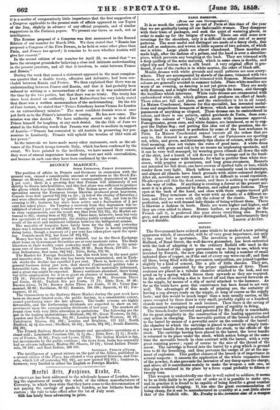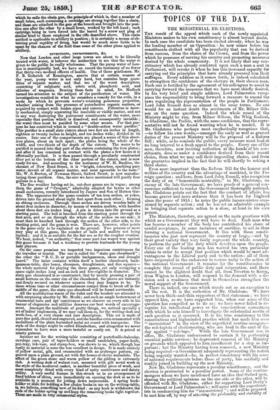RIFLE&
The Government have ordered some trials to be made of a new priming apparatus which, if successful, will be of very great importance, not only to the army but to sportsmen. The invention is patented, and Mr. Holland, of Bond Street, the well-known gunmaker, has been entrusted with the task of adapting it to the ordinary Enfield rifle used in the army. Instead of the copper percussion cap so long in use, which was invented by Forsyth, the new plan consists in taking a number of small indented discs of copper, as if the end of every cap-were cut off; and than all these, being filled with the percussion composition, are joined together slightly by a kind of cement, like a pile of little cheeses. They are, however, easily separated by the proper application of force. These roukaus are placed in a tubular chamber attached to the lock, and are acted on by a spring which forces them upwards as they are required. In the action of cocking a disc is forced off and then moved forwards on to the nipple by means of a slip of metal attached to the hammer. As far as the trials have gone this contrivance has been found to act very well. The advantages of this mode of priming are, the certainty of having a cap always ready on the nipple so long of course as the supply
lasts; and this would be much larger tfian a man usually carries, as the space occupied by these discs is very small, probably eighty or a hundred rounds may be contained in each rouleau. Then there is the saving of the movement for capping and consequent gain of rapidity in firing.
The breech-loader invented and patented by Mr. Freeby is remarkable for its great simplicity in the construction of the loading apparatus and easy action in charging. The moveable portion of the breech is attached to the barrel by meana of a powerful screw on the outside of the barrel ; the chamber in which the cartridge is placed is exposed by simply turn- ing a lever handle from its position under the stock, to the offside of the stock. The cartridge having been placed in the barrel, the lever handle is returned to its place under the stock, which action brings at the same time the moveable breech in close contract with the barrel, with a very great resisting power ; equal of course to the size of the thread of the screw. The cartridge is forced into the barrel by a plug which is ground true to fit the breeching, and thus prevents the escape of air at the mo- ment of explosion. This perfect closure of the breech is of importance in several respects ; it ensures the application of the whole expansive force of the powder, it also prevents the intrusion of any damp upon the charge, and above all it contributes mainly to make the weapon a safe one, as this plug is retained in its place by a force equal probably to fifteen or twenty tons. This weapon is undoubtedly one that is well suited to soldiers, it seems to be as little liable to be put out of order as it is possible to make one, and in practice it is found to be capable of being fired for a great number of rounds without clogging. It has also the great recommendation of being cheap, for it can be manufactured in quantity at a cost little above that of the Enfield rifle. Mr. Freeby is the inventor also of a weapon
which he calls the chain gun, the principle of which is, that a number of small tubes, each containing a cartridge are strung together like a chain, and these are attached to the gun at the breech and brought into the posi- tion one after the other by a small lever, worked by the left hand ; each cartridge being in turn forced into the barrel by a screw and plug of similar kind to those employed in the rifle described above. This chain method is applicable to artillery in position ; it is certainly a means of ob- taining great rapidity of firing, but would be much more liable to be upset by the chances of the field than some of the other plans applied to artillery.
INVENTIONS, IMPROVEMENTS, &C.
Now that London and other large towns are about to be liberally treated with water, it behoves the authorities to see that the water so given to the public be really wholesome. That the pump water of Lon- don is unmitigatedly bad, we have on record the testimony of no fewer that thirty-two medical officers of health. One of those gentlemen. Mr. F. B. Goderich of Kensington, asserts that at certain seasons of the year, pump water is not only hard, but contains large quan- tities of organic matter, and that too of the worst description; consisting of sulphuric acid, nitric acid, phosphoric acid, and chlorine of magnesia. Bearing these facts in mind, Dr. Medloek turned his attention to the subject of the purification of water. His investigations resulted in what he considers a remedy for the evils, in a mode by which he prevents water's retaining poisonous properties, whether arising from 'the presence of putrefactive organic matters, or acquired by contact with leaden pipes and cisterns. Filtration is mere- ly mechamcal, simply separating the insoluble or visible matter, and not in any way destroying the putrescent constituents of the water, more especially that portion which is dissolved, and oonsequerrtly invisible ; the water then must be purified by some other means. For that pur- pose he has contrived what is termed a "double-action water purifier." This purifier is a small elate cistern about two feet six inches in length, eighteen or twenty inches in height, and ten inches wide; divided in its centre. Into one of the compartments are placed a series of thin sheet- iron plates, about an inch apart ; the plates being the whole of the width, and two-thirds of the depth of the cistern. The water to be purified is poured into that part of the cistern containing the iron plates ; smd after it has remained in -contact with the plates a few hours it is effectually purified. It is then passed through a peculiarly constructed Biter pot at the bottom of the other portion of the cistern, and is now ready for use. And according to the testimony of W. H. Buckles, the chemist of New Bond Street, it is "bright, colourless sparkling pure water, devoid of all organic matter, and most agreeable to the taste.' Mr. W. S. Burton of Newman Street, Oxford Street, is now manufac-
turing these purifiers. One, the size we have mentioned will purify, four gallons in a day. The fine weather having set in, out-door games are in vogue ; among them the game of "Croquet," admirably adapted for lawns or other small enclosures, recently introduced by Jaques and Son of Hatton Gar- den. The apparatus for the game consists of ten iron arches, or yokes, driven into the ground about eight feet apart from each other ; forming an oblong enclosure. Through these arches are driven wooden balls of about four inches in diameter, by means of wooden mallets, with handles about three feet six inches long. A pin is driven into the ground as a starting point. The ball is knocked from the starting point through the first arch, and so on through the whole of the arches on one aide; it must then be knocked back through the arches of the other side, to the starting point, and the game is won. There are, however, other points In the game only to be explained on the ground. Two persons or more may play at this game, the number of balls and mallets not beiug limited; and it is as suitable for the fair sex as for the rougher creation. We hear, indeed, "on authority," that some poet has waged war against this game because it had a tendency to provide husbands for the young lady players.
On the same premise's we inspected two ingenious contrivances for the traveller or tourist. The one is called the " atatu quo chessboard" ; the other the "B. C. I). or portable backgammon, chess and draught board." The latter contains within itself a leather chessboard, back- gammon-table, dice boxes, chessmen draughtsmen, and dice squares— the whole material for playing the time games, yet only occupying a space eight inches long and an inch and five-eighths in diameter. The statu quo chessboard is so constructed, that by merely pressing a pair of small buttons on the outer rim of the chessboard, the pieces are instantly and fuinly secured on whatever squares they may happen to he. To those whose time or other circumstances compel them to break off in the middle of the game, the statu quo ehessbord will be found serviceable.
All the multifarious wants of the toilet and the boudoir are attended to with surprising alacrity byMr. Mechi ; and such an ample bestowment of ornamental taste and apt contrivance as we observe on every side in his bazaar of elegancies and utilities deserves our best words of encourage- ment. Amongst the multitude of pretty things, we noticed specially a set of ladies' implements, if we may call them so, for the writing-desk amil work-box, of a very chaste and rare description. This set is made of pure fine gold, chased and engraved, and the handles even ornamented with medallions of the plain burnished metal set round with tourquoise. The style of the design might be called Elizabethan, and altogether we never remember to have seen a more tasteful or costly set. It is priced at ninety guineas.
Another set for the writing-table consisting of portefenille-kalendar, envelope case, pair of taper-holders or small candelabra, paper-knife, pen-tray, ink-vase, and stamp-box, was shown to us, which though less costly in material is none the less excellent in design. It is made entirely of yellow metal, gilt, and ornamented with an arabesque pattern, en- graved upon a plain ground, set with flat bosses of choice malachite. The effect of the green stone and warm yellow of the gilding is extremely rich. A writing desk of walnut root, mounted with gilt metal work in the style of the medimval casket, is another beautiful piece of work, and most completely fitted with every kind of natty contrivance and dainty utility. A very useful feature in this struck us in an arrangement of fixed tablets of china, seen immediately on opening the desk so as to be available in a moment for jotting down memoranda. A spring book- holder or slide for holding a few choice books in use on the writing-table is, we believe, something new of its kind : as any book is withdrawn the ends of the holder spring up and keep the remaining books tight together. These are made in very ornamental styles.

























 Previous page
Previous page